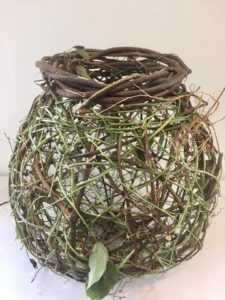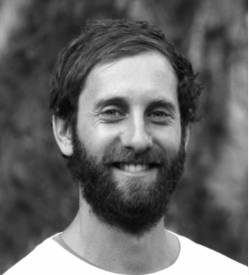Weaving the New Story
Many of us realise that the new story about Australia as a global renewable energy superpower is just a continuation of the extractivist ideology of global capitalism that has led to our current climate and environmental crisis.
Because it is not just about environmental degradation, global warming and species extinction.
It is about the unconscionable greed of the global 1%; the continued exploitation of the most vulnerable in the name of profit and productivity; the growing wealth inequality, not just between the so-called global north and global south, but within nations from the richest like the USA and Australia, to the poorest like India and Africa. It is the legacy of European colonialism, followed by the neo-colonialism of capitalism through the oil, gas and coal industries and the finance sector, and its latest guise in the platform capitalism of the tech giants: apple, amazon, alphabet, alibaba, facebook.
Many of us are yearning for a new story, for a revolution in consciousness. Through Regenerative Songlines Australia, Dr Mary Graham, a Kombumerri and Wakka Wakka elder, living on the Gold Coast, has outlined how we can do this through the ‘relationist ethos’ of the new songline, linking place, balance, autonomy and the ethics of empathy to create a self-regulating ‘civilisational culture’ of two way learning.

Jillian Culey, Exhibition November 2021, Gang Gang Gallery, Lithgow
Taking weaving as our metaphor, can we weave a new story combining the weft of First Nations knowledge systems with the warp of the best of western sciences—physical, social, ecological and biological?
Can we transform the role of the creative arts from that of entertainment-consumerism, to the role it played in the songlines of First Nations knowledge systems that criss-cross Australia? That kept their culture and knowledges alive for over 65,000 years, even through the epistemic violence of settler colonialism that declared Australia ‘terra nullius’—unoccupied, its Indigenous people no more than ‘fauna’ to be eliminated if they stood in the way of ‘productive’ use of the land, imported from the United Kingdom. A ‘productive’ use of land that in little more than 230 years has produced widespread environmental degradation, loss of soil fertility, and raging and destructive bushfires.Green Music
 In 2013, Tim Hollo, Executive Director of the Green Institute, co-founded Green Music: greenmusic.org.au
In 2013, Tim Hollo, Executive Director of the Green Institute, co-founded Green Music: greenmusic.org.au
He now sits on the Board together with Tracee Hutchison (Chair), Tina Kothari, (Deputy Chair), Jen Rowe, (Treasurer), Tara Medina, Nidala Barker, and Marcus Seal.
A central focus of Green Music’s activities is to stand in solidarity with First Nations people, who Green Music acknowledges have been protecting this land for tens of thousands of years and have the knowledge and culture to guide us back home.
“Our campaigns for environmental change cannot be successful without honouring and normalising First Nations leadership, and centralising and amplifying their voices.”
Green Music sees its role as organising, facilitating and inspiring musicians and the broader industry to make changes to improve our environmental performance, from energy use to packaging and waste to transport.
“Through leading by example and bringing our audiences along with us, we can create deep, cultural change.”The Green Music Team
 Berish Bilander, CEO
Berish Bilander, CEO
Berish Bilander is a composer, musician, and activist dedicated to climate and social justice. He has co-written and toured with a range of artists including Vika and Linda Bull, Jaimi Faulkner, and new music ensemble Motion. As an activist, Berish has worked with local climate action groups to support state, and national campaigns run through Friends of the Earth, and in 2013 helped found Public Transport Not Traffic.
 Emma Bosworth, Campaigner
Emma Bosworth, Campaigner
Emma is a songwriter with a great passion for conserving our climate and natural environment. She has been a professional in the music industry and environmental movement for fifteen years. Emma believes anything can be achieved if it’s for the greater good of our people and planet, and understands that art, particularly music, has a large role to play in social change.
 Tenaya King, Communications & Research Officer
Tenaya King, Communications & Research Officer
Tenaya is a student at the Australian National University in Canberra, studying a Bachelor of Environment & Sustainability and a Bachelor of Politics, Philosophy & Economics. She is passionate about the outdoors, music, photography, and action on the climate crisis. Tenaya has been actively involved in environmental campaigning since aged 14, and coordinates communications & media content, environment-related academic research and volunteer engagement for GMA.
Patrons of Green Music
Rob Hirst, Midnight Oil; “By providing the soundtrack for the rewilding of the earth, we’ll help save ourselves, our children, and all those who follow.”
Missy Higgins: “We can try to tread more lightly on the planet.”
Rhoda Roberts AO: “Music is a universal language. We have always harnessed the voice of the song lines – that guided us across country, lyrics providing knowledge, joy and reflection – always reminding us of what we have and what we need to nurture. From the great classics to the next wave of creative song writers, in the 21st, Green Music is an organisation that proudly continues to make us think , reflect, and celebrate the global new song lines.
John Butler: ‘Green Music Australia do such great work in facilitating artists and community to get involved in the issues and campaigns that really matter throughout our great red land.”
Montaigne: ‘The music industry is of great influence, defining culture and producing events globally which shape people’s experience of life and the world around them.”
Katie Noonan: “As Uncle Kev said ‘From little things big things grow’ – all of us making small changes collectively is how we change our world.”The Power of Music in Environmental Activism
Given the power of music in stirring our hearts and souls, music has a very important role in helping us weave the new story that will find our way back to a profoundly eco-spiritual relationship with the natural world of which we are an intrinsic part. Away from the terrible story embedded in Genesis 1.26, that God made ‘man’ in his image and gave him ‘dominion’ over the Earth and all its creatures for his benefit.
Far from instilling in we humans a duty of stewardship, this edict instilled in us an arrogance that the rest of nature served our purpose for leisure, pleasure or economic resources.
The consequences of this have played out since the European Industrial Revolution and its materialist vision for science—to the factory farming of animals, factory fish farming of the ocean depths, wholesale clearing of forests for industrial-scale mono agriculture, and the growing crises of species extinction and zoonotic pandemics. To create a human species at war with its own home, Planet Earth, in a downward spiral of technological entrancement, objectification, myopic greed, arrogance, violence and inter-generational theft.
Thoughts from Richard Khan
Antioch University, LA, and author of “Critical Pedagogy, Ecoliteracy, and Planetary Crisis: The Ecopedagogy Movement” (2010): richardkahn.org
Many musicians involved with environmentalism are folksingers, or alternative and independent artists, such as Woody Guthrie, Pete Seeger, Earth Crisis, Ani DiFranco, Michael Franti and Spearhead, or Dead Prez. Still, surveys of the most enduring and powerfully impactful environmentalist songs find that they come from major mainstream pop and rock recording artists like Joni Mitchell, Marvin Gaye, Michael Jackson, Neil Young, Pearl Jam, and Radiohead. The last few decades have also seen the organization of spectacular benefit concerts devoted to environmentalist messages, such as Jackson Browne, Bonnie Raitt, and GrahamNash’s No Nukes events, Willie Nelson and John Mellencamp’s Farm Aid, Sting’s Rock for the Rainforest, and (through partnership with former Vice President Al Gore) Live Earth.
The 1960s were a time when the folk revival went mainstream along with the environmental movement, amidst a period of intense social engagement. As a result, all manner of artists penned and recorded their own songs with either a direct or connoted environmentalist conscience—musicians like Bob Dylan, Joan Baez, Peter Paul and Mary, Buffy Sainte-Marie, and Country Joe McDonald to name but a few. By the decades end, Joni Mitchell, a songwriter who (like Dylan) began to blend folk styling with rock music and other genres, released what is considered to be one of the all-time greatest environmentalist songs, “Big Yellow Taxi” (with its infamous chorus of “Don’t it always seem to go, that you don’t know what you’ve got till it’s gone; they paved Paradise and put up a parking lot”). A year later, in 1970, she also provided “Woodstock” (the commemorative countercultural anthem that suggests the famous concert exemplified an Hippie environmentalism based in cosmic connections to the land and nature’s healing powers).
Rock Music and Protest
Even more than folk, rock and other forms of popular music have widely promoted messages of environmental activism. Beginning in the 1960s, when the youth counterculture took to such music as a form of protest against perceived conservative standards, many rock musicians began recording songs that took up negative issues associated with environmental degradation as well as those that articulated the liberation offered by the dawning of people’s new ecological sensibilities and consciousness. By some accounts the decade’s most iconic band, The Grateful Dead, did not overtly take up environmentalist politics in their music until 1988, when they partnered with the United Nations and Rainforest Action Network to take action and raise money for Amazonian conservation programs.
Yet, they began as the house band for the Merry Prankster’s “Acid Tests,” with Pranksters like Ken Kesey and Stewart Brand going on to become major environmentalist voices in literature. Further, the Dead were the headline band (along with the environmentally-minded, Jefferson Airplane) for the first of the spectacular countercultural happenings—the Human Be-In at San Francisco’s Golden Gate Park in 1967.
Here rock music, poetry, psychedelic drugs, eroticism, and politics (including environmentalism) combined to create a new form of communal entertainment event that typified the ways in which music helped contribute to the organization of alternative forms of culture that could be the participatory seedbeds of social transformation.
The Problem of Green Washing in the Global Music Industry
While the Vietnam War, and the sort of environmental vandalism profiled by Rachel Carson’s Silent Spring, galvanised the protest generation of the 1960s and 1970s, its ability to fundamentally challenge the ‘animal spirits’ of capitalism were soon lost. Those same folk, now the Baby Boomers of today’s world have led a society that is characterised by the intergenerational theft of wealth, housing, and the ‘good life’, to create a very scary future for our grandchildren and their children, not to mention all the other life forms with whom we share our Planet Earth.
Can the global climate and environmental crisis mount a similar generational rage and creative output to more effectively challenge the capitalist world order to weave the new story we so desperately need?
Today, environmentalist songs are arguably more ubiquitous than ever before, being globally performed by artists on every continent—for example, by Scandanavia’s Bjork, South Africa’s Ladysmith Black Mambazo, Senegal’s Yousou N’Dour, Mexico’s Maná, Brazil’s Paulo Lara, Japan’s Mr. Children, and Australia’s Midnight Oil. Paul D. Miller, also known as DJ Spooky, has even recently unveiled his multimedia acoustic portrait of climate literacy, Terra Nova: Sinfonia Antarctica, a kaleidoscopic tone poem of sounds sampled from his journey to the South Pole.
However, musicians as artists, are caught in a terrible vice of platform capitalism and the nature of the music industry, their desire to make their music and reach an audience, and the need to earn a living. The COVID pandemic has shown us how precarious life is for people in the creative arts, particularly the performing arts such as live music and theatre.
Can organisations like Green Music find a pathway forward for musicians to help lead us out of the dark to create a new global songline that celebrates the relationist ethos of First Nations cultures?

![Call of the Dakini | A Memoir of a Life Lived [Extract]](https://regenesis.org.au/wp-content/uploads/2023/08/Catalogue-OF-Articles-by-Barbara-Lepani-July-2018-July-2023-.jpg)
Recent Comments